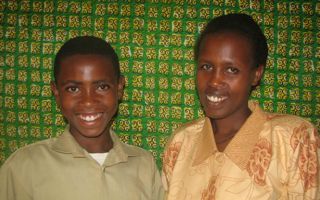Mukangarambe Pascasie wants her son to know his maternal family history, since he knows little about her life as a young girl, and why her marriage to Gahigi Jean Pierre's father did not work out well. She describes that the difficulties for young girls right after the genocide, their need for protection and love after terrible times, led many into hasty marriages. Her father was a hero to her before he died, “a loyal creative man” who was determined to give them a good future, the best he could. Because Gahigi Jean Pierre, born right after the genocide, is confused about the killings, she encourages him to talk to his friends, and to her about these questions, and reassures him that genocide will never again happen to him, or her.
"One thing gave me hope. People started giving me hope, examples of those who had left their homes due to impatience. I learned that I had to be strong and I had to be my children’s role model, just like our dad was. We never lacked anything when he was still alive. I struggled with my children and wished them to have a good life." Mukangarambe Pascasie
"What was the name of your father? When did you complete your education? How old were you?" Gahigi Jean Pierre
| Attachment | Size |
|---|---|
| SFH0090.pdf | 187.8 KB |




